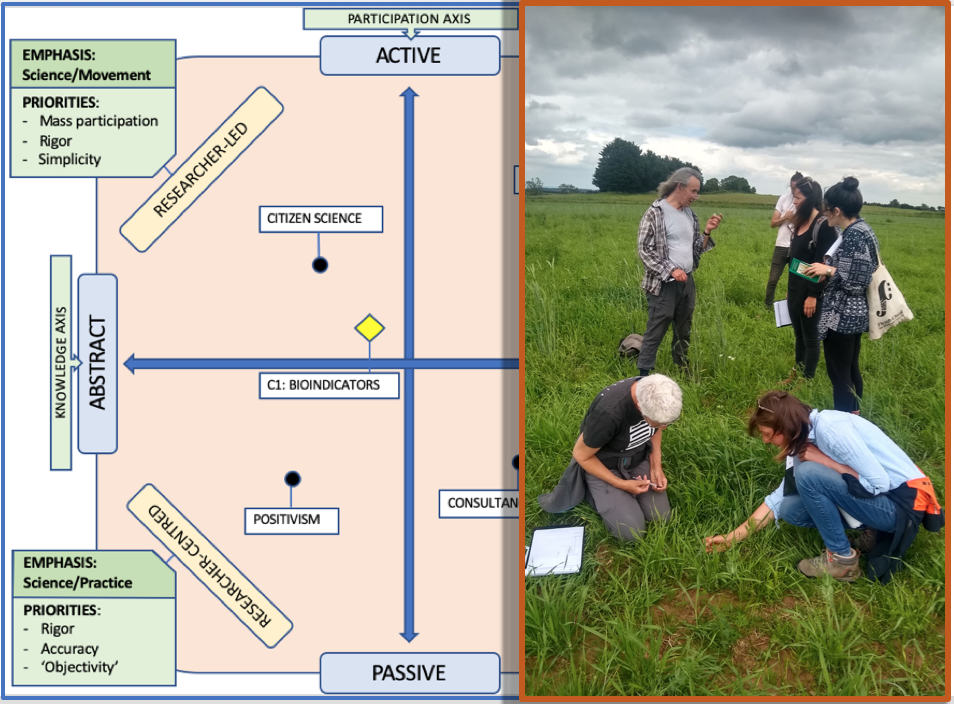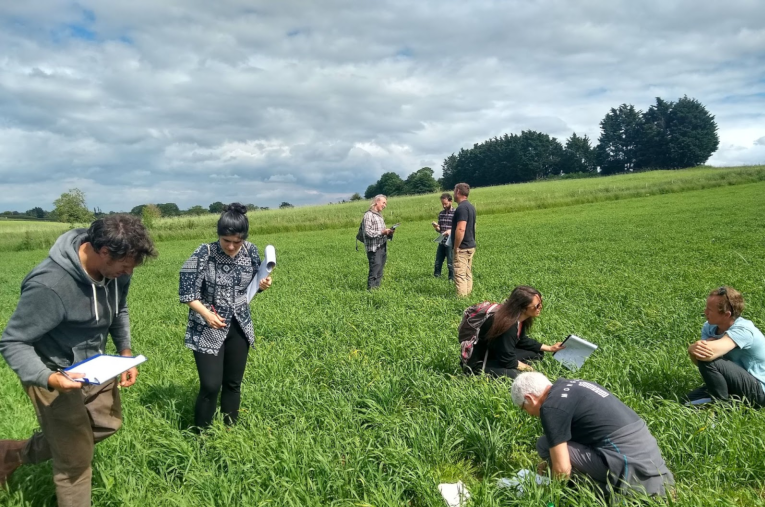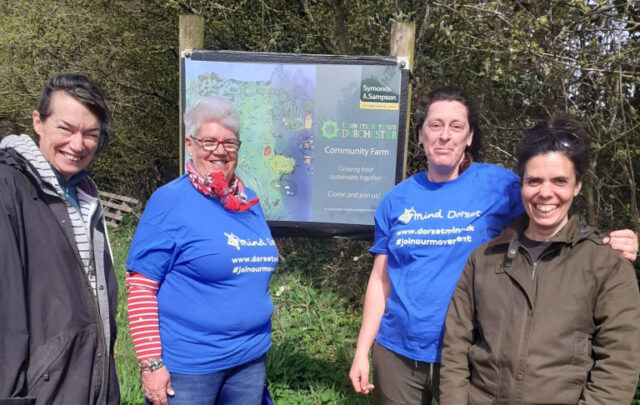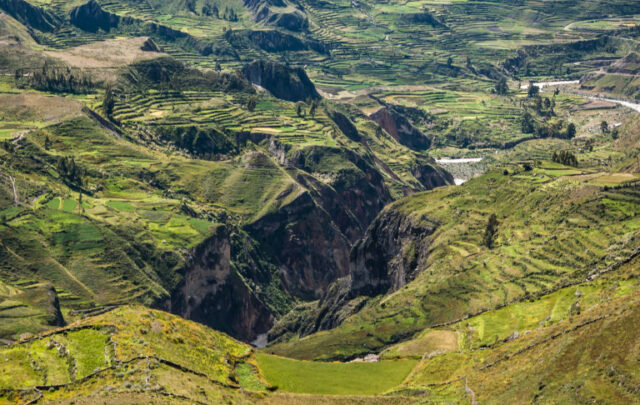In this blog, Chris Maughan and Colin Anderson discuss their recent open access article ‘A Shared Human Endeavour’, which offers a new model for designing participatory agroecological research and knowledge co-production. Based on an analysis of their recent participatory research activity, they offer reflections on the importance of considering the shifting needs and capacities of research collaborators, and warn against inadvertently creating a constraining dogma of participatory action research. A knowledge-participation ‘schematic’ is offered as a tool for undertaking this work.

Introduction
Often the tools and methods we use as researchers keep us rigidly in our lane. For agroecology, this is particularly relevant as an approach that is fundamentally about understanding and honouring the irreducibility and interconnectedness of our world. While a positivist science is often privileged in research, agroecology implies the mobilisation of different kinds of knowledges that reflect the multiple dimensions of agroecology as a science, practice and social movement.
While this openness and holistic thinking was always something that attracted us to agroecology, it is also something we have struggled to operationalise as researchers. If the food and agricultural systems we work with are indeed fundamentally connected to all beings and things, how do we manageably undertake this work? If everyone is really affected, who do we collaborate with, and on what terms?
In a recent open-access paper ‘A Shared Human Endeavour’ we discuss our attempts to operationalise an approach to participatory agroecological research and knowledge co-production. We wanted to offer something that might help us, but also fellow researchers, to undertake future research that continued to honour complexity without being too complicated, and to include diverse collaborators in ways that truly accomodated their needs.
What we came up with is something we wish existed when we were starting out as researchers in agroecology; in short, a model for working out the needs and objectives of our research collaborators and matching these with the kinds of knowledges required by them and their communities.
Above: Participants undertaking a botanical survey on the first ‘Bioindicators field walk’ at Gothelney Farm, one of the cases analysed in this study.
What did we do?
In the paper, we draw and reflect on the iterative and feedback processes we built into the original research. Using three direct experiences of participatory agroecological research, we returned to the surveys, interviews, and reflective processes that we used to assess the research at the time.
The three case studies varied considerably in their research approach: one project, for example – which examined the use of ‘plant bioindicators’ as a tool for assessing soil condition – was markedly researcher-led and focussed in time and space. At the other extreme, the ‘Farm Hack UK’ case study was a long term collaboration, a strongly participant-led process of agroecological tool development unfolding over many years. The third, a project called ‘Field Learning’ involving a participatory field trial with a community-supported ‘peasant bakery’ in Wales – sat somewhere in between the two, combining active and passive participation.
Looking across all the case studies we began to build a model – referred in the article as a ‘schematic’ (Fig. 1) – of our research approach. The model was built around two key dynamics underlying all research – knowledge production and participation – each conceived as a spectrum, from ‘active to passive’ participation and ‘abstract to applied’ knowledge.
Above: Figure 1 – Dynamics of knowledge production and participation in research processes (simplified version).
We used this as a basic set of coordinates to start mapping the three case studies of knowledge co-production, to understand how each project had evolved to fit specific needs and contexts of its participants. For instance, the Farm Hack project, led by a group of farmers wanting to develop tools and skills to meet their particular needs, was positioned top right, due to its focus on applied knowledge and active participation. Contrastingly, the bioindicators project was further to the left as it dealt with more abstract knowledge (i.e. surveying methods and generalised botanical knowledge), while still involving somewhat active participation of those that commissioned and shaped the study.
Findings
While each project focused on including farmers in agroecological research, we found that the types of knowledge production and participation varied extensively in each project. As the needs and capacities of our research collaborators varied, so did our research designs, the tools we used, and the materials we created. What this confirmed to us was agroecological research’s inherent transdisciplinary nature, and its resistance to valorising a static set of tools or methods, or even types of interaction. Instead, we started to notice new commonalities in terms of the principles and ethos guiding our research. We share a short description of each of these before returning to the schematic to elaborate in light of our cases.
Above: tool design feedback session at the Thames Valley Farm Hack 2019.
Sharing resources equitably
Across all our cases we noted the importance of resource sharing, in particular the fair remuneration of co-researcher labour. In some of our cases, the research wouldn’t have been viable without paid time for participants, most notably with Field Learning. Moreover, many of the disabling aspects identified by participants from the other cases could have been addressed with more resources, such as funding to subsidize costs (like travel and subsistence), but also training to deal with the challenges of co-delivering agroecological research.
Balancing of trade-offs in research co-design
Despite agroecology’s vast integrative aspirations, individual research projects can’t be ‘all things to all people’. Indeed, a prominent concern across the case studies related to the trade-offs inherent to research design. For instance, there were certain objectives normally associated with “conventional” (or what we call “researcher-centered”) research which were in evident opposition to other objectives more common in agroecological research. For example, the pursuit of “rigour” or “objectivity” could easily result in the needs of participants being deprioritised by selecting methods which proved to be too onerous (or “boring”) to reliably engage participants in the long-run.
Above: laying out the field trial during Field Learning project with Torth y Tir in 2019
Adapting to changing roles and responsibilities
Agroecology represents a fundamental paradigm shift in the way we think about our food and farming systems—and this is no less true of the co-production of knowledge and research in agroecology. Some of the central operating principles of knowledge co-production are holism, place-specificity and the co-existence of different ways of knowing. This often means that the researcher, like the agroecological farmer, must be able to adapt to context and fulfill a wider variety of roles than they have historically. A key role highlighted by the case studies was the “researcher as facilitator” of a dialogues of knowledges amongst research collectives.
Mapping out researcher-participant interactions
The key contribution of our research was to return to our original schematic (Fig. 2) that we used to frame the research. The result was what we hope will be a useful tool for researchers looking to consider where their research lies in a vast field of possibilities. We hope it can be useful in making decisions early on about allocation of (or need for) resources, the types of participation and knowledge desired by participants, and the specific roles required of the researcher.

Above: Figure 2 – dynamics of knowledge production and participation in research processes (elaborated).
While there may be a tendency for agroecology researchers to gravitate toward the top right quadrant due to its emphasis on participant autonomy, it is important to remember that the graph is value neutral—i.e., no research mode is meant to be ‘better’ or ‘worse’ than another. What is most important is that research projects emerge out of collective processes between researchers, affected communities and their organizations. In some cases, these collective processes may reveal that there is a need for large randomized control studies which are largely carried out by research professionals – for example, in the effort to build evidence for the efficacy of green manures in building soil carbon. In other cases, more small-scale and participatory processes might be more appropriate, as in the case of Farm Hack, designing and re-designing tools for those in specific cultural, economic and agroecological settings.
In short, this is to remind researchers to avoid inadvertently creating an agroecological research dogma based on the notion that every method used needs to involve the full participation of affected communities. This itself falls into the error of treating Participatory Action Research as a method, rather than as an approach that uses multiple methodologies and pedagogies rooted in a wider participatory social process. Within this context, a team co-producing knowledge should seek to deploy methods across the two axes (Fig. 2), rooted in a transformative research worldview to co-produce knowledge as a part of wider social processes aimed at emancipation of the human and more-than-human world.
Final Thoughts
Our research article (which can be read in full here) examined three concrete examples of knowledge co-production in agroecology with the aim of better understanding how to create a more mutually beneficial, and inclusive research culture for the co-production of knowledge. We argue that, though it is complex, it is not beyond our collective abilities to design and implement research in ways that don’t oversimplify the world, or dehumanize or instrumentalise research participants.
Critical in this process is an ability for researchers to become embedded in collective processes of agroecology transitions, and to be willing and able to shift to meet the needs and priorities that emerge through these relationships. This can be conceptualized as a wider process of knowledge co-production, viewed as a distributed but intentional social process to mobilize knowledge in action. This approach to research has the potential to be deeply empowering and enlivening – like farming, it is a shared human endeavor in which it is our collective right to participate.









